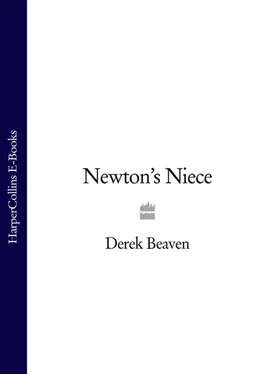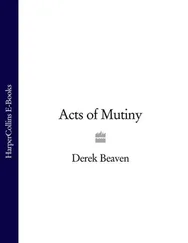I thought of Michelangelo painting the Sistine Chapel. We write our own story on the walls of our world; we project ourselves on to our account of the past – and the future. I did not think of Isaac Newton stitching his own version of things with meticulous and mathematical care into the very fabric of the universe so that scarcely a mouse could wriggle out from under those skirts.
Occasionally a naked madman lay unconscious on the stone floor. When I saw my first I’d thought he was dead. I went over, pulling off my rubber gloves, and knelt by his head. The memory of a star reflected in a pool of blood had flitted in, and out, of my mind. From where? From what? Then I’d noticed the fitful rising of his back. I took the details to one of the bored male nurses.
‘It’s alright,’ he said. ‘He’s OK. It’s the heat.’
‘But he’s lying on the stone.’
‘Just leave him. He’s OK.’
Unable in my condition to recognise negligence, I’d gone back and mopped around the terrible exhibit.
I began on the walls. Working my powders into a biting lather, I sought out the villainy of the place. I restored a fallen glory square foot by square foot, dodging the bouncing corrosive splashes that leapt off the tiles and paintwork towards my eyes. Inhaling God only knew what combination of active vapours, I mopped; I bucketed, seized with a grim enthusiasm. And the treasures of the floor and walls went raw into the jakeses from my brush and dustpan: sludges, geodes, hair, dead insects and arachnidae, a rubber glove and tainted paper waste, a mouse’s skull and tail, a set of used plasters, dust and tomato, the ghost of a prophylactic and several other unnameable matters. I didn’t flush.
Time rubbed on in my frenzy. I hardly noticed. Until suddenly I was assaulted through the high-stationed open windows by an infernal roaring and clanking. Then the frosted screen of the sky was blotted out. I identified the rattle of a huge diesel; presumably it was an apartment-sized delivery juggernaut parking close up next to the glass. So I found myself dark within one cubicle, scrubbing and deafened. It was a mechanical and stinking dark, and gave rise to non-visual sensory streaks: a trace of recaptured taste, and, with my hyperventilation, a recalled other smell mingling in my nostrils with the present fume. My lips pulled back from my teeth in a frightening grimace. I stilled them automatically.
Even as I tried for calm the cubicle floor grew unsteady. The seals and grouts sweated. Something hurt violently in my head, and something else was illuminating the wall in front of me. I swung round to look up and back for the source of the rays, but there was only noisy, noisome dark, and the shouts of men outside. But when I regained my balance and turned back, forms were cast on to the surface in front of me. I tried to erase them from the wall of the cubicle with my scrubbing: bright transfers which began to declare themselves as lewd cartoons. They animated their moments, unrolling themselves beyond my brushstrokes. Still in my ears was the unstoppable roaring of the engine.
They held an initial fascination, these workings. They glowed and ran and re-expressed themselves. They scudded across the wall of the one cubicle and led me beyond, hiding themselves in the pipe-work where my brush couldn’t reach. I panicked again with that wretched desperate feeling in my stomach. They were mine. They took me fast and crazy round the whole place, dabbing and scouring. The more I tried to dash them out the brighter they became, some too obscene, others too gorgeous – episodes from the history of my world. They defied cleaning powder and led across roughnesses of plaster, the dull drum of coated metal, the ridged slide of tiling, back to my original cubicle. She was there, that woman the doctors were talking about. Her long locks gleamed over water. I stared across a lake whose surface was immense. It was as though I stood upon a cliff. The moon’s reflection – the moon itself – whirled in incredible rings and gears. It winked. It was loose in its chapel with water and tides.
I moved into action once my stomach had finished heaving. Putting off the need to drink, I groped to empty my whole container of powder into that bowl, and then, as my eyes normalised to the persisting but ordinary gloom, went on to all the others areek with their abominable soups. Next I made them ready for their final flush by stirring and diving with my brush, lest the huge energy of the event I’d just witnessed should eructate again out of the U-bend.
The lorry moved away while I was finishing the last. The rattling of its diesel drew off from my little lavatorial cave and the sun streamed in.
When I opened the cubicle door I saw there were great sweeps of foam where I’d brushed. Powder was everywhere. My rubber gloves felt claggy.
I wanted to leave it all behind there and then, but merely poking my head out into the corridor brought back the shrunkenness of the fallen world, and the wretched taste in my mouth. I’d seen too much; it had to be expunged. There was nothing for it but to mop the walls properly this time; to squeeze out in the bucket all that revelation.
In a while, though, more stable and beginning to relax, I recalled the whole ulterior purpose of today’s entry into the toilets: the Bleach! That was no problem. My canisters tipped up conveniently over the well of the moon and stars. How simply the stuff gurgled down as if to give my whole vision a longed-for chemical white-out.
Now I could legitimately make my way over there. Standing by the last bowl, I cast an idle eye over the legend on the yellow plastic container I held in my hand:
NOT TO BE USED IN CONJUNCTION WITH OTHER LAVATORY CLEANERS
I mustn’t share it with Seco? A joke? And then the mocking air went green and clutched at my eyes with caustic fingers. I gasped – the worst thing I could have done, because it made me gasp again. Instead of getting out I found myself coughing stupidly at the mirrors over the wash-basins, trying, as I gazed at my reflection, to make sense of the greenness and painfulness of things, and the seemingly relentless malice of the day.
Seco appeared at the door.
‘Eh, Jacob! Saphir says …’ He sniffed, choked, coughed, shouted, and yanked me from the faint green cloud. ‘Santa Siberia! What! You do a Devil’s fart?’
We coughed and retched our way out – out along the corridor by the dining-room, through the foyer I’d mopped that morning, through the double glass doors and right into the rose garden, where he fell to roaring hysterics. And while I comforted my eyes and jerked up a bit more corroded spittle from my insides, he pirouetted among the rose-bushes. Thus among their gaudy blooms, he shed his urbanity and shrieked with laughter. The sun flashed on his sharp Roman teeth.
‘For God’s sake stop laughing and get me a drink, you bastard!’
‘OK OK. I get for you. You lie on the grass. What the hell you doing in there?’ And he coughed and giggled all over again. I stretched myself on the corner of the dry lawn. ‘Eh? What was it?’
‘What’s so damn funny? I could have been killed in there.’
Seco’s eyes narrowed and his grin froze. ‘I save you, mate. You got no gratitude with you bloody toilets. I’m Secondo. I’m second son – Lucky. Lucky for you, eh?’
‘Yes. Sony. Thanks very much. Now for Christ’s sake get me a drink. Please.’
‘That’s better. Otherwise I take you back to you damn toilets and I kill you.’
While he went off to the scullery I lay back. The sun worried the prickly-watery feeling in my eyes. My chest hurt from the gas, my stomach from the retching. I shifted a bit to my side and gazed over the mass of the asylum. Against the tough heatwave-blue stood the observation tower – what else could it be, that great fat Italianate finger, widening at the top to accommodate a windowed look-out under its pinnacles? The whole thing was a celebration of imprisonment, in two colours of brick topped with its gilt pyramid of a roof. It watched over the colony of suffering as if with a magnificent eye; or perhaps was a mere deserted symbol. Either way the effect was that we all policed ourselves, uncertain whether God was really watching from above.
Читать дальше












